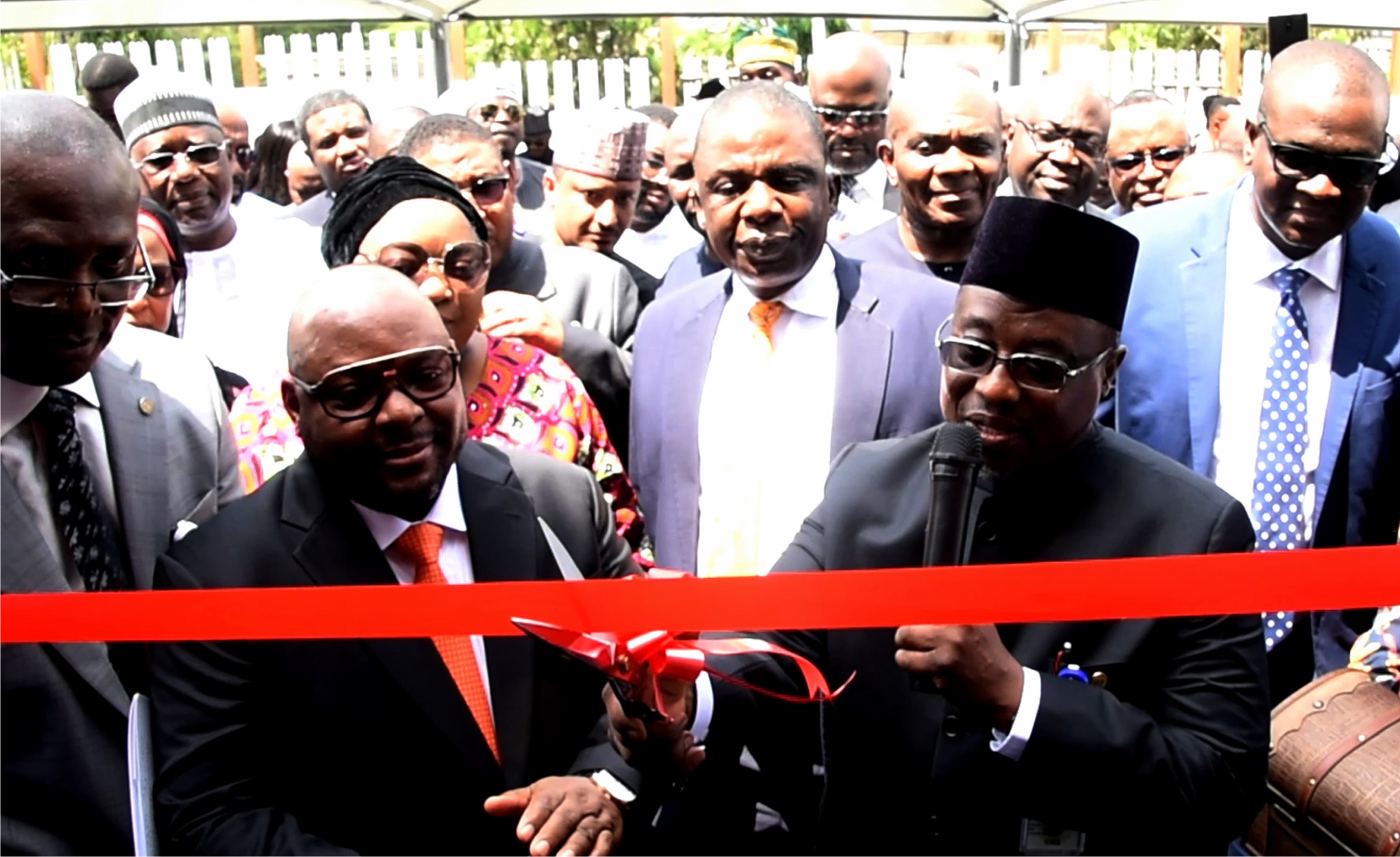Oil & Energy
NNPC Remains Largest Gas Supplier To Power Sector –Baru

The outgoing Group Managing Director of the Nigerian National Petroleum Corporation (NNPC), Dr. Maikanti Baru has disclosed that the national oil company remains the leading supplier of gas to the nation’s power sector.
He made this disclosure during the inauguration of a compendium produced by the Corporate Services Directorate of the NNPC in Abuja over the weekend.
He attributed the feat to the effective management strategy adopted by the current leadership of the corporation, adding that the NNPC was on the part of sustainable growth with a number of critical projects that would impact the industry value chain.
He expressed satisfaction at the level of achievements recorded through the 12 Business Focus Areas (BUFA), a strategy guide adopted by NNPC management under his watch, noting that the expected results of today’s effort would surpass current milestones.
“NPDC production has grown in leaps and bounds; NNPC is now the largest gas supplier to the power sector and steady progress is being made on frontier exploration with the spud-in of Kolmani River-II Well,” he stated.
The GMD said with the taming of security challenges and the commencement of the rehabilitation of the refineries and pipeline depots across the country, the corporation was on the right track to continue to add value to the national economy.
“Security challenges that had hampered exploration and production activities have been tamed,” he said. “New business models have been developed across NNPC businesses, leading to phenomenal boosts in productivity and lessening of cash calls burden on government, achieved through alternative funding arrangements we developed. In his address on the occasion, Chief Operating Officer, Corporate Services, Malam Isa Inuwa, who statutorily retired from the services of the corporation, yesterday stated that the compendium on the activities and achievements of his directorate was to document history and processes that will serve as a guide to management.
He said under his watch as the COO, NNPC’s Corporate Services Directorate had moved from money spending perspective to a value-creating arm of the corporation. Isa also expressed delight that his leadership of the CS Directorate produced quality documents that had enabled the NNPC management to achieve strategic goals of the corporation.
Oil & Energy
Bill Prohibiting Gas Flaring Passes 2nd Reading

The Bill for an act to prohibit gas flaring, encourage commodity utilisation, and provide for penalties and remedies for gas flaring violations has passed its second reading in the House of Representatives.
Sponsored by the Member representing Ikorodu Federal Constituency (APC, Lagos), Babajimi Adegoke Benson, the bill seeks to prohibit the flaring and venting of natural gas, except in strictly regulated circumstances, while encouraging the utilisation of gas resources to foster economic growth and energy generation.
The proposed legislation aims to mitigate the environmental, health, and economic impacts of gas flaring, aligning Nigeria’s oil and gas operations with international climate change commitments.
Offenders, who violate the provisions of the proposed law, would face stringent penalties, including fines of $5 per 1,000 standard cubic feet of gas flared and potential suspension of operations for repeat violations.
Leading debate on the general principles of the bill, Benson said gas flaring has plagued Nigeria for decades, resulting to severe environmental degradation, public health crises, and economic losses while it environmentally, contributes to greenhouse gas emissions, global warming, and acid rain, exacerbating climate challenges.
The lawmaker said public health impacts of the practice are equally dire, as pollutants from gas flaring cause respiratory and cardiovascular diseases, particularly among residents of communities close to flaring sites.
According to him, economically, flaring results in the waste of a valuable resource that could otherwise be harnessed for energy generation or exported to generate revenue.
Benson insisted that the bill was designed to address those issues while bringing Nigeria in line with global standards such as the Paris Agreement on climate change.
“The bill provides for a comprehensive prohibition of gas flaring except in emergencies or when explicitly authorised by the Nigerian Upstream Petroleum Regulatory Commission (NUPRC).
“Operators are required to submit and implement Gas Utilisation Plans, detailing how gas that would otherwise be flared will be captured, processed, or commercialised.
“Offenders, who violate these provisions, face stringent penalties, including fines of $5 per 1,000 standard cubic feet of gas flared and potential suspension of operations for repeat violations. Furthermore, the Bill ensures that communities affected by gas flaring are entitled to compensation and environmental restoration, creating a mechanism for redress.
“Transparency and accountability are integral to the enforcement framework of this Bill. Operators must submit regular reports on gas flaring incidents, which will be audited and made publicly available by the NUPRC. This approach ensures public oversight and stakeholder engagement, fostering trust and compliance.
“Nigeria’s adoption of this Bill positions the country to emulate such success, ensuring a balance between environmental stewardship and economic development.
“The implementation of this Bill will be overseen by the Nigerian Upstream Petroleum Regulatory Commission, which will monitor compliance through regular audits, enforce penalties, and facilitate gas utilisation projects in collaboration with operators and development partners.
“The Anti-Gas Flaring (Prohibition and Enforcement) Bill, 2024, is a timely and necessary response to one of Nigeria’s most pressing environmental challenges. Its provisions are both practical and forward-looking, addressing immediate concerns while laying the groundwork for a sustainable future.
“I urge all Honourable Members to support the Second Reading of this Bill as a demonstration of our collective commitment to environmental protection, public health and economic progress”, he added.
###
Oil & Energy
‘Indigenous Companies To Gain From Shell’s Contract Awards’

Oil major, Shell, has restated its commitment to the development of Nigerian companies through contract awards and scaling up of expertise.
Managing Director, Shell Nigeria Exploration and Production Company ((SNEPCO) Limited, Ron Adams, made the remark while speaking at the Opening Ceremony of the 13th edition of the Practical Nigerian Content forum held in Yenagoa, Bayelsa State, with the theme “Deepening the Next Frontier for Nigerian Content Implementation”.
Represented by the Manager, Business Opportunity, SNEPCO’s Bonga South-West Aparo Project, Olaposi Fadahunsi, he said several benefitting companies had taken advantage of the patronage to expand their operations and improve their expertise and financial strength.
Adams said, “Shell companies execute a large proportion of their activities through contracts with third parties, and Nigeria-registered companies have been key beneficiaries of this policy aimed at powering Nigeria’s progress”.
He emphasized that Shell companies in Nigeria also continued to develop indigenous manpower through scholarship programmes with over 3,772 undergraduate and 109 Niger Delta post graduate scholarships since 2016.
“As we speak, beneficiaries of the 13th edition of the Niger Delta Post Graduate Scholarship awards are pursuing their studies in the United Kingdom. The employability rate of the scheme is high with over 98% of the graduates who won the awards securing employment in the oil and gas industry, academia and Information Technology, among other sectors, within one year of completing their studies”.
He commended the Nigeria Content Development and Monitoring Board (NCDMB) for ensuring compliance with the Nigerian Content Act saying “Nigerian content will continue to be an important part of Shell operations”.
The four-day conference hosted by the Nigerian Content Development and Monitoring Board (NCDMB) and participating companies reviewed progress on the development of Nigerian content pertaining to the implementation of the Nigerian Oil and Gas Industry Development (NOGICD) Act since it was enacted in 2010.
Shell companies in Nigeria are among the more than 700 oil and gas entities that participated in the forum with a strong message of support for Nigerian companies, having awarded contracts worth $1.98 billion to the businesses in 2023 in continuing effort to develop Nigerian content in the oil and gas industry.
Oil & Energy
NNPC Begins Export From PH Refinery

The Nigerian National Petroleum Company Limited (NNPCL) has sold the first cargo of Port-Harcourt low sulfur straight run fuel oil (LSSR) to Dubai-based Gulf Transport & Trading Limited (GTT).
The company is expected to load the cargo in the coming days onboard the Wonder Star MR1 ship, signalling the commencement of operations at the plant and the exportation of petroleum products.
The ship would load 15,000 metric tons of the product, which translates to about 13.6 million litres.
Although the volume coming from the NNPC into the global market is still small, the development has the potential to impact the Very Low Sulphur Fuel Oil (VLSFO) benchmarks in the future, while changing the market realities for Atlantic Basin exporters into Nigeria and other regions.
The sulfur content of the export by NNPC stands at 0.26 per cent per wt and a 0.918 g/ml density at 15°C, according to Kpler, a data and analysis company.
The cargo was reportedly sold at an $8.50/t discount to the NWE 0.5 per cent benchmark on a Free on Board (FOB) basis.
Kpler reported that the development would help displace imports from traditional suppliers in Africa and Europe, as Nigeria’s falling clean product (CPP) imports are already decreasing, dragging imports into the wider West Africa region lower as well.
-

 News2 days ago
News2 days agoWE NEED TO WORK TOGETHER IN S’SOUTH TO ACHIEVE REGIONAL DEV, FUBARA INSISTS
-

 News2 days ago
News2 days agoTinubu Rejoices As Warri Refinery Begins Operations
-

 News2 days ago
News2 days agoTinubu Mourns Ex-US President, Jimmy Carter
-

 News2 days ago
News2 days agoNigeria Has No Reason To Be Poor – Ooni
-

 News2 days ago
News2 days agoIN RIVERS, GOD REMAINS OUR ULTIMATE LIBERATOR – FUBARA
-

 News2 days ago
News2 days agoCHRISTMAS: FUBARA, WIFE HOST RIVERS CHILDREN, TASK THEM ON EXEMPLARY CONDUCT
-

 Nation4 days ago
Nation4 days agoBodo-Bonny Road: Julius Berger Workforce Maintains Steady Work to ensure timely delivery
-

 News2 days ago
News2 days agoFUBARA MOURNS FORMER RIVERS GOV

